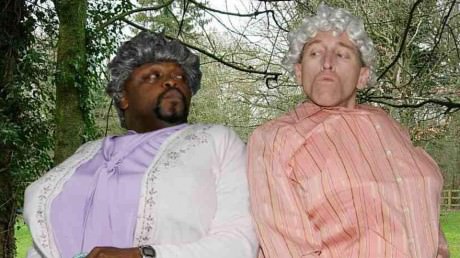“So different. So alike. Who knew?” Such is the premise of this smash hit show, which has played across not only across the country but across the ocean (of all places—given the theme—Edinburgh), with a glossy, packed press packet that would feel at home at an international film festival.
Using a mix of theatrical and thrift-store costumes and props that range from the evocatively homespun to the deliberately outrageous and over-the-top, the beefy black man and his more delicately constructed Jewish friend, both dressed in black T-shirts, slacks and shoes, play to and against type. As they take turns recalling the history of indignities and horrors perpetrated against their respective peoples, at times forced unwillingly to confront those committed by their respective peoples against the other, their reactions tellingly reflect the litany of misperceptions, half-truths and, in the worst cases, outright lies they were raised with.
At first they use two very large, masterfully designed, personality-plus puppets to represent each other, one of their people, or someone who is not, clearly feeling safer saying seemingly insensitive and potentially offensive things indirectly. But they soon become comfortable enough to be able to not just challenge each other, but laugh at each other and at themselves, and the puppets—much like masks they might have worn to conceal their feelings and fears—go back to being colorful but lifeless lumps of cloth on chairs.
Times have changed, the men agree; while prejudice is alive and well, it seems to have shifted targets. It’s no longer just about color; today, fear and stereotypes combined with individual comfort levels create “feareotypes,” an invented but useful word. And young people, who in the fifties and sixties were at the forefront of social justice movements, but today are more likely to find “personal advancement” the one indispensable goal app, might find it worth saving to their iPods.
What does it mean? Roughly: When each time something happens to reinforce a pre-existing fear or stereotype, it gets stronger, and the positive memories of that group start to fade, pushed out by the negative reinforcement, because those memories are older and more deeply rooted. Some, though, the men enjoy playing to. Contemplating each other’s physique, they note that the good food each of them has raved about may be equally good, but unequal in impact: “The Jewish guys eat,” the two agree ruefully, but with a wink, “and the black guys get fat.”
Jones, a founder of the troupe, brings knowingly, smoothly, vividly to life, on stage and in the video clips built into the show, a raft of stereotypical black characters of all ages, male and female. Andy Schlossberg (who was a last-minute replacement, with this his first stage performance of anything, we were later told) holds his own, and deserves a huge shout-out for taking on this demanding role on short notice.
Running Time: 75 minutes.
The Black-Jew Dialogues plays through July 18, 2013 at the Goethe Institute – 812 7th Street, NW, in Washington, DC. For performance times and to purchase tickets, visit the show’s Capital Fringe page.
LINK
2013 Capital Fringe Show Preview: ‘The Black-Jew Dialogues’ by Kristen Gaydos.
The Black-Jew Dialogues
Written by: Larry Jay Tish and Ron Jones
Directed by: Margaret Ann Brady
Featuring: Ron Jones and Larry Jay Tish (in these performances, Andy Schlossberg).





